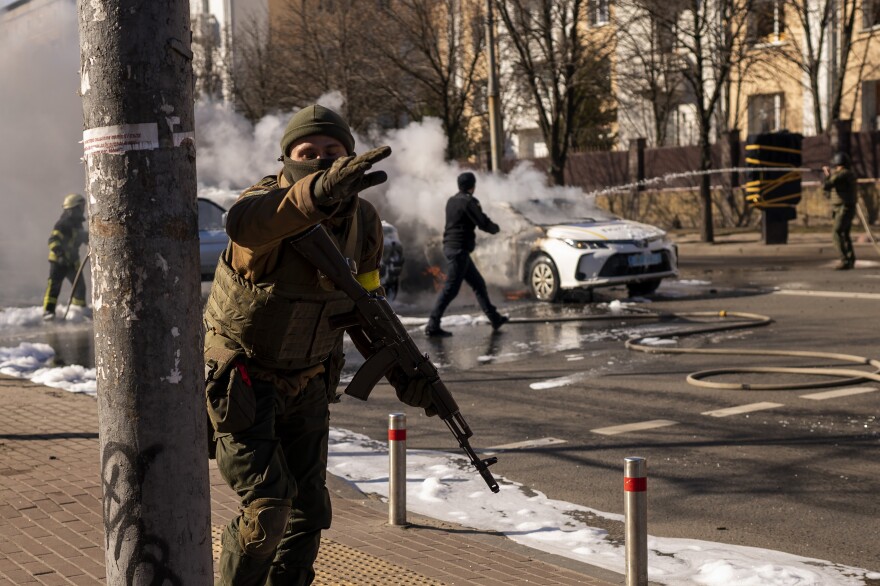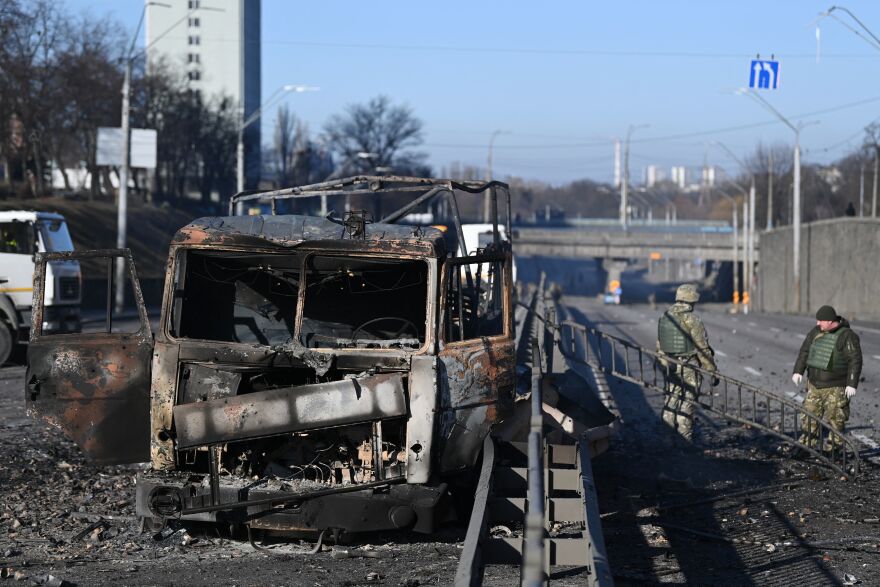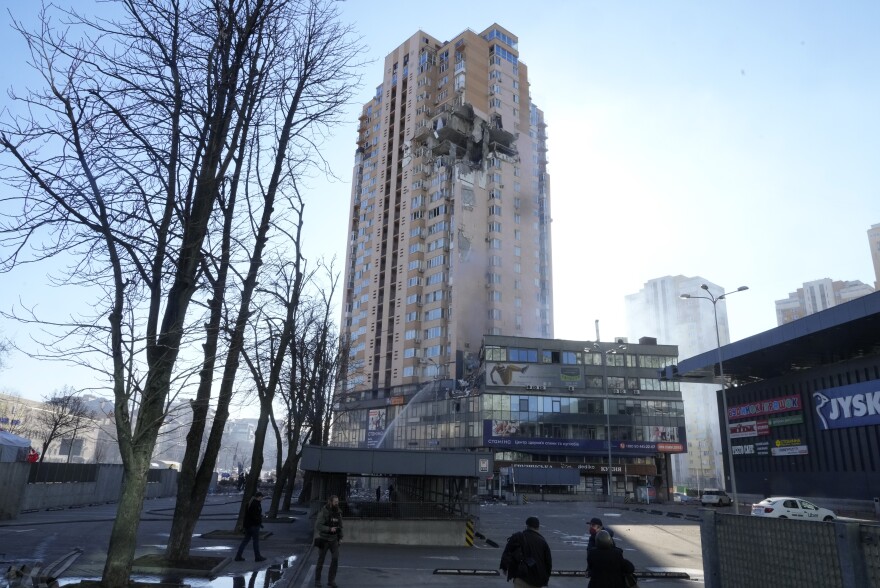Updated February 27, 2022 at 7:39 AM ET
The U.S., Canada and European allies are moving to cut off certain Russian banks from the SWIFT bank messaging system as part of a dramatic new round of sanctions meant to punish Russia for the ongoing invasion of Ukraine.
The White House issued a statement saying, in part, "we commit to ensuring that selected Russian banks are removed from the SWIFT messaging system. This will ensure that these banks are disconnected from the international financial system and harm their ability to operate globally."
SWIFT is a key mechanism in the global financial system that supports millions of secure messages daily to facilitate bank transactions worldwide.
The White House did not initially back the SWIFT cutoff in previous discussions about sanctions on Russia, citing concerns from European allies and that the action could have "spillover effects."
Alexandra Vacroux, executive director of the Davis Center for Russian and Eurasian Studies at Harvard University, described cutting a whole country from SWIFT as a "nuclear option." In an interview with NPR last month, Vacroux said it could have wide-ranging effects.
When Iran was cut from the system, she noted, "they lost half of their oil export revenues and 30% of their foreign trade."
The European Union and the U.S. would finalize the list of which particular banks will be cut off from SWIFT, the White House said.
The newest sanctions are part of the allied powers' plan to "ensure that this war is a strategic failure for Putin," according to an administration official who briefed reporters on the condition of anonymity.
The U.S. and allies say they will also impose restrictions aimed at the Russian central bank's assets, targeting the country's $630 billion in foreign currency reserves that it could use to support the ruble.
Countries in the group say they plan to limit the sale of citizenship, or "golden passports," that allow wealthy Russians to become citizens of other countries through investment. Some European countries are among those that allow the practice.
The group also plans to launch a task force to identify and freeze the assets of sanctioned Russian oligarchs, their relatives and associates, and work to prevent them from hiding their assets overseas.
So far, the U.S. and its allies have targeted 10 of Russia's biggest financial institutions, White House officials said Saturday. On Thursday, the Biden administration said it would block Russia's largest bank, Sberbank, from accessing the U.S. financial system. The administration also announced new financial sanctions for VTB, the second-largest bank, and three other financial institutions.
The U.S. also says it will ratchet up efforts to combat disinformation.
Germany joins the U.S. in providing military aid

Meanwhile, the United States and Germany are providing hundreds of millions of dollars worth of military aid to Ukrainian forces as they attempt to repel the massive Russian invasion.
President Biden authorized $350 million in military assistance Friday, which includes Javelin anti-tank missiles, small arms and body armor to support Ukraine's front-line military defending against the Russian attack, Pentagon spokesman John Kirby told reporters Saturday. That brings the total U.S. assistance to $1 billion over the past year, Kirby said.
Germany is also sending anti-tank weapons and missiles to Ukraine. "The Russian attack marks a turning point," Chancellor Olaf Scholz said in a tweet. "It is our duty to do our best to help Ukraine defend against the invading army of #Putin. That's why we're supplying 1000 anti-tank weapons and 500 stinger missiles to our friends in the #Ukraine."
The move marks an abrupt shift in Berlin's policy of not sending German-made weapons into conflict zones. This stance has fueled widespread international criticism of Germany in recent weeks, especially as numerous Western allies have sent Ukraine guns, ammunition and anti-aircraft defense systems. Germany's policy reversal could mean a rapid increase in European military assistance for Ukraine.
Ukrainian president urges citizens to 'stand firm'
Fierce street fighting was reported in Kyiv as Ukrainian troops defend the capital city against the ongoing Russian invasion. Air raid sirens blared throughout the night as the city was hit by missiles and rockets. Ukrainian President Volodymyr Zelenskyy is urging Ukrainian citizens to stay inside, take cover and "stand firm."
Zelenskyy released two videos since Friday, cautioning that he and his family are top targets and disputing what he says is disinformation being spread that he has called on his army to surrender.
"We have withstood and successful repelled enemy attacks," Zelenskyy said in a video message, according to a BBC translation. "The fighting continues in many cities and districts of our state. We are defending our country, the land of our future children.
"Kyiv and key cities around the capital are controlled by our army," he said. "The occupiers wanted to block the center of our state and put their puppets here, as in Donetsk. We broke their plan."

A senior U.S. defense official confirms that Russians are facing stiff resistance by Ukrainian forces, and have not yet taken any major cities. About half of the estimated 190,000 Russian forces that had been deployed near Ukraine prior to the invasion were in Ukraine as of Saturday afternoon local time.
Russian troops were about 19 miles outside Kyiv, but Russian reconnaissance — likely part of the Spetsnaz special forces — were inside the city, the U.S. official said. Thousands had landed by ship in the southern city of Mariupol, and were heading north to Donbas.

Ukraine's health minister reported Saturday that 198 people had been killed and more than 1,000 wounded so far. Damage includes a missile that struck a high-rise apartment in southwestern Kyiv overnight, injuring several people. "Stop Russian war criminals!" Foreign Minister Dmytro Kuleba said in a tweet.
Daily life in Ukraine has been upended since the invasion began Thursday. Schools are suspended; many families are hunkered down at home, but many are also trying to flee the country, jamming highways. Satellite imagery shows a 4-mile-long traffic jam of people, cars and trucks trying to cross into Romania near the Siret border crossing.
Nearly 120,000 people have fled Ukraine
The United Nations says nearly 120,000 people have fled to neighboring countries in recent days. Most of those leaving are women and children; men ages 18 to 60 aren't permitted to cross the border, since they may be drafted into the fight.
The White House announced Friday that it would join European allies in sanctioning Russian President Vladimir Putin and Russian Foreign Minister Sergey Lavrov personally. The sanctions will include a travel ban.
Turkish President Tayyip Erdogan told Zelenskyy in a phone call Saturday that his government is trying to broker an immediate ceasefire, Reuters reports. Also Saturday, U.N. Secretary-General António Guterres told Zelenskyy that the United Nations would soon begin asking countries for funding to support humanitarian operations in Ukraine.
Russia vetoed a U.N. Security Council resolution on Friday calling on Moscow to end its invasion.
NPR Pentagon correspondent Tom Bowman and Berlin correspondent Rob Schmitz contributed to this report.
Copyright 2022 NPR. To see more, visit https://www.npr.org.








